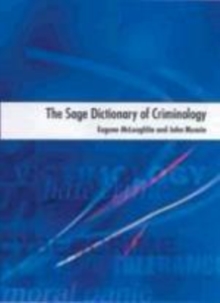The compilers have done criminology a tremendous service.
This dictionary is an invaluable resource for students and teachers and I'm certain will be a key reference work for years to come' - Professor Tim Newburn, Goldsmiths College, University of London, U.K.
Great dictionaries inform, intrigue and investigate.
McLaughlin and Muncie's perceptive collection does all three.
The Sage Dictionary of Criminology is wide and accessible enough to interest anyone concerned with crime, the law and the panoply of issues and explanations that surround them.
This admirable volume will inform, guide and contribute to debates in the years ahead' - Ellis Cashmore, Professor of Culture, Media and Sport, Staffordshire University, author of Dictionary of Race and Ethnic Relations and co-editor of Dictionary of Cultural Theorists Eugene McLaughlin and John Muncie have brought together, for the first time, the work of some 70 academics and practitioners worldwide to produce the definitive reference and research tool for criminological studies and related fields.
The Sage Dictionary of Criminology is informed by the principle that criminology is a contested, contradictory and interdisciplinary discourse marked by constant incursion, interactions, translations, deviations and transgressions.
It is this diversity that makes the study of crime and criminal justice both complex and challenging.
The dictionary sets out and explores traditional and emergent agendas in criminological studies to not only reveal its grounding in a myriad of theoretical and conceptual concerns but also to draw attention to its expansive and developing subject matter.
As a result there is no one conception of criminology to be foundin the dictionary but rather a multitude of criminological perspectives which in themselves often depend and draw upon knowledges and concerns generated from elsewhere.
The entries have been compiled from a truly international group of contributors including:: Jock Young on Left Realism: Hal Pepinsky on Peacemaking Criminology: Clive Hollin on Psychologies of crime: Kathleen Daly on Feminist criminologies: Barbara Hudson on Justice: Tony Jefferson on Masculinities: Jill Radford on Radical Feminism: Willem de Haan on Redress: Pat O'Malley on Governmentality: Colin Sumner on Censure: Betsy Stanko on Violence: Jeff Ferrell on Cultural criminology: Sandra Walklate on Victimisation: Richard Sparks on Penality: Robert Agnew on Strain theory: Gregg Barak on Newsmaking criminology: Dragan Milovanovic on Postmodernism: Stuart Henry on Crime: David Greenberg on Criminal careers The Entries Each entry is either:: central to the field; an intellectual benchmark; a major theoretical position; a key theoretical concept; a central criminological method; a core criminal justice philosophy or practice; or: an emergent thematic in the shifting and expanding field of criminological studies.
Each entry contains: Definition - which sets out the basic parameters of the concept itself.
Distinctive features - which are encyclopaedic in style and allow for some detailed comment on the concept's origins, development and general significance.
Evaluation -of those concepts considered to have greatest theoretical weight and lasting legacy in order to encourage critical reflection.
Associated concepts - to cross reference to related concepts included in the dictionary and to facilitate a broader and in-depth study.Key readings - to reinforce the aim of the dictionary as a learning resource to be built upon by the reader.
This excellent reference tool concludes with both a subject and a name index to further enhance its accessibility.
All of these features establish this work as a leading study guide for introductory courses in the field, as a primary source of reference for advanced study, as a necessary supplement to established textbooks and as a state-of -the-art reference guide to the specialized language of theoretical and conceptual criminology.
The SAGE Dictionary of Criminology provides a comprehensive introduction to criminological theory, its diverse frames of reference and its expansive modes of analysis.
It is an up-to-date and accessible resource for students and teachers in the fields of criminology, criminal justice studies, the sociology of crime and deviance, socio- legal studies, social policy, criminal law and social work.

